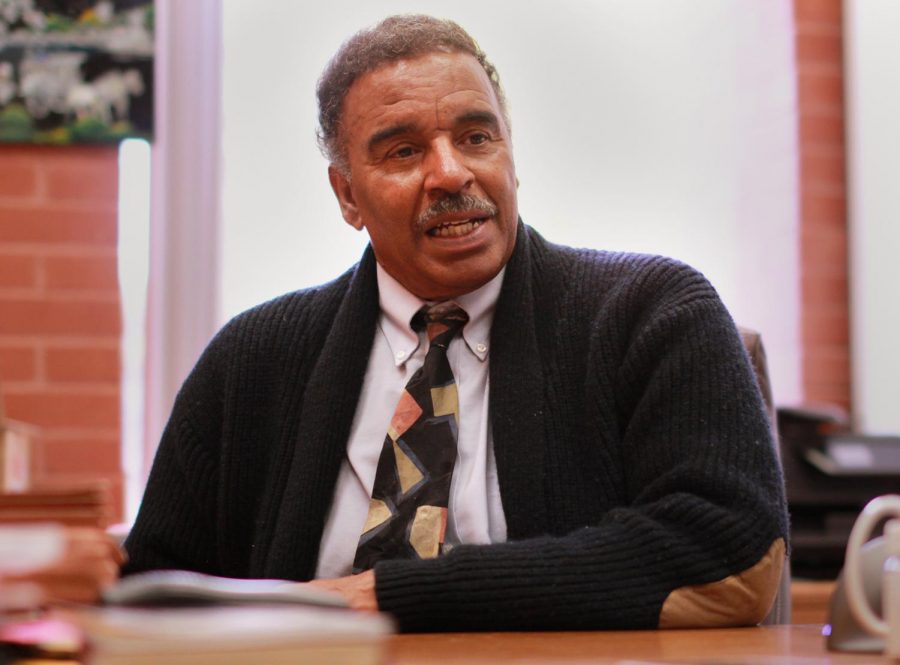Cultural competency teaches professionalism
Solution underway for training sit-in demand, leaders say
RACHEL SUN | The Daily Evergreen
Jeff Guillory says he wants students to understand cultural competency is not only important for ethical reasons, but is vital for professional careers.
November 7, 2017
University leadership is still unsure whether cultural competency training for incoming students, which many students have called for amid heightened diversity issues over the past year, will become mandatory in the future.
Jeff Guillory, WSU’s interim executive director of Diversity Education, said he approaches cultural competency from a business lens, showing students how to interact with members of other cultures professionally and respectfully.
“I think what [cultural competency training] does,” Guillory said, “is it gives us a voice, it gives people an opportunity to speak, to recognize what their own values are.”
When Guillory leads his trainings, which are currently voluntary, he always asks participants to introduce themselves by talking about who they are, rather than what they do. This approach generally blindsides many participants, Guillory said, as many people are used to talking about their responsibilities and accomplishments, rather than their character.
He said this method trains participants to have a new mindset when prepping for an interview.
During a training, Guillory describes a detailed scene of an occupation, such as a plane full of passengers, and a person in the scene, such as a woman in uniform, walking down the aisle. He then asks everyone to write the assumed position of this person.
After everyone has written their answers, Guillory discusses each occupation and how stereotypes can affect the perceptions participants have of others.
He does not ask participants to share their responses, but does say what the person in the scenario is. The plane and woman in uniform example, was a pilot and not a flight attendant.
Guillory said his job is to effect change by providing others with an opportunity to talk about their purview of the world.
Cultural competency training was one of five demands students made of administrators in August. After the sit-in, leaders from various groups on campus, such as Black Student Union and Gender and Sexuality Alliance, met with WSU President Kirk Schulz and Vice president for Student Affairs Mary Jo Gonzales to discuss how those demands could feasibly be met. Suggestions from the group included introducing cultural competency as programming for incoming freshman, similar to Green Dot and Booze, Sex and Reality Checks.
Gonzales said via email that the specifics on a possible mandatory cultural competency training would be determined by a workgroup that would meet and discuss training details.
Because the workgroup has not been finalized, there are no specifics on the structure, budget, funding or instructors for cultural competency training, she said.
Jenne Schmidt, program coordinator of Diversity Education, said training would provide an opportunity for others to express their experiences, as well as their differences.
A mandatory cultural competency training would set a standard for the university, Schmidt said.
“It says there’s an expectation of respectful interaction with each other,” Schmidt said. “We can be our whole diverse beings in this institution and be included.”
Although current cultural competency training addresses many important issues, Schmidt said that it could involve more issues, such as power and privilege and systemic inequality.
By offering the training to extended campuses in Spokane, Puyallup, Mount Vernon and Yakima through live videoconferencing, as well as a live session on Pullman campus, cultural competency trainings are available to all WSU campuses, Guillory said.
The last part of Guillory’s training includes walking participants through four different prompts, based upon real-life scenarios.
One of the specific situations was through the perspective of a professor.
The prompt describes a student praying in the corner of a classroom. Another student is distracted and requests that the professor ask the student not to pray during instruction. The professor must figure out how to approach the situation.
The group discusses the prompts, and Guillory provides feedback on how to handle situations regarding communication and interactions, in hindsight of cultural differences within personal, work or school environments.
Through the formulation of the training curriculum, Guillory said cultural competency trainings provide open dialogue between students, faculty and staff on campus.
“The best answer is to teach each other,” Guillory said. “How are we gonna know that? We talk about it.”
Editor’s note: Cultural competency training is available on all WSU campuses, not just some campuses.










